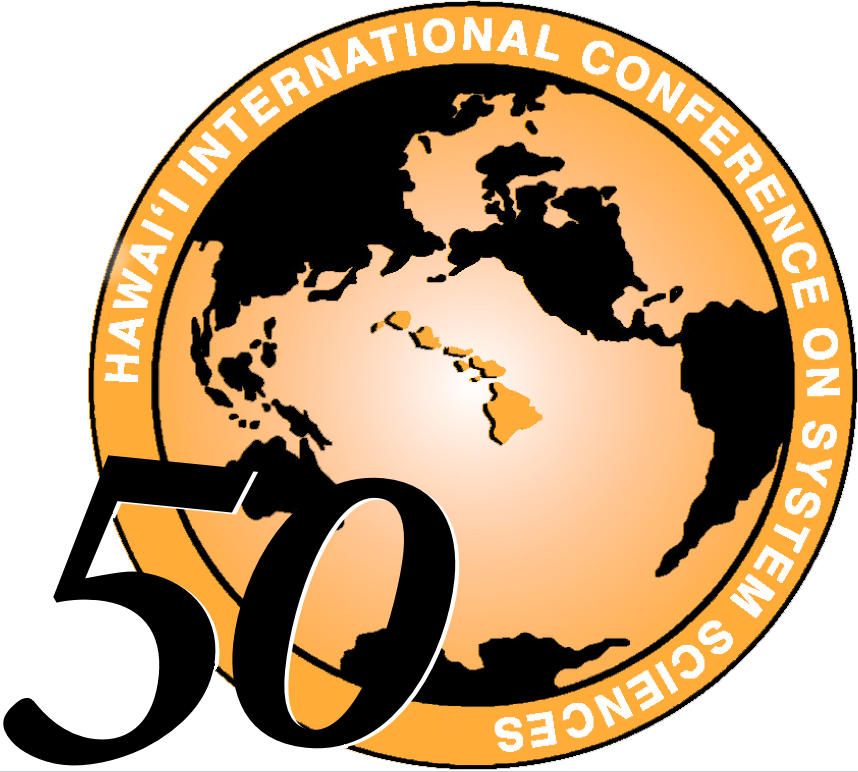HICSS - 50 E-Government Track
50th Hawaii International Conference on System Sciences
January 4-7, 2017 - Hilton Waikoloa Village, Big Island, HI, USA
Overview
Minitracks
Symposia and Workshops
Other Links
Social Media and Government



Minitrack Description
Social media have received a lot of attention in recent years. Platforms such as Facebook, Twitter, and LinkedIn provide mechanisms for individuals to come together and create networks based on a variety of factors, such as existing friendships, common interests, and professional or political affiliations. Citizens are increasingly aware of how the use of social networks can facilitate communication and interaction, and potentially support and promote political communication – both among themselves and with government – and greater engagement in public affairs. Social media increase the opportunities for individual users to share digitally-created political content and ideas. Recently, the role of social media in promoting civic engagement and supporting social movements in both democratic and non-democratic countries, where activists use the power of social media to influence events on the ground and promote their causes, has been discussed.
Government agencies have also discovered the potential of social media platforms for sharing governmental information and outreach, in order to promote transparency, and increasing citizens’ participation in their public policy making processes. Social media become increasingly powerful communication channels, and enhance opportunities for citizens to provide feedback to government officers and political representatives, and also to share their knowledge, experience and creative ideas (‘citizen-sourcing’). Furthermore, government agencies increasingly discover that social media can effectively support the delivery of services to citizens, and the co- creation of value in co-operation with citizens. However, there are no established practices for the use of social media for the above-mentioned variety of purposes, as social media use is something relatively new in governmental agencies, so many difficulties and challenges exist for the implementation of the above in government.
Moreover, many issues related to privacy, information leakage, blurred boundaries between private and public spheres, and government surveillance, must all be urgently addressed. It is highly important not only to develop effective practices for using social media in government for the above purposes, but also to analyze and evaluate them from various management and political sciences perspectives, to identify their strengths and weaknesses, and also the conditions under which each of them can be useful and effective.
This minitrack aims at attracting high-quality research papers investigating various aspects of social media use, both by citizens for political purposes (political information, opinions and ideas exchange, and also political action and mobilization), and also by government agencies for the aforementioned purposes (disseminating information to citizens for promoting transparency, collecting from them feedback, knowledge, experience and creative ideas (‘citizen-sourcing’), promoting citizens’ participation, value co-creation and supporting services delivery), or other purposes.
Minitrack topics include, but are not limited to:
- Theoretically sound analysis of case studies concerning the use of online social media by government agencies of various levels (local, regional or central government)
- Social media for government information sharing and transparency
- Social media and citizen participation
- Social media for supporting and promoting value co-creation in co-operation with citizens
- Social media for government services delivery
- Development of effective practices for social media use by government agencies for the above purposes or even other purposes
- Analysis and evaluation of practices for social media use by government agencies
- Apps and Social media: implementation and challenges
- Social media use by citizens for political information, opinions and ideas exchange, and political action and mobilization
- Relationship between online social media use and offline political action
- Website information link with social media tools
- Predicting election and other political events using social media content
- Implementation challenges with respect to social media use in government
- Maintaining privacy in online social media and other online networks
- Social media and governance: problems and challenges
- Social networks and ‘information overload’
- Guidelines and policies for social media use in government
- Legal issues concerning the provision and sharing of information via social media
- Maturity models of social media use by government agencies
- Social media use for public agencies’ internal activities
- Social media use in public-private network
More information on the mini-track chairs:
Rony Medaglia, PhD, is an Associate Professor at the Department of IT Management (ITM) at the Copenhagen Business School in Copenhagen, Denmark. His research focus is on digital technologies in the public sphere, e- government and IT in the public sector. He has authored publications in international journals and conferences, including Information, Communication and Society, Government Information Quarterly, the International Journal of Public Administration, Communications of the Association for Information Systems, the International Conference on Information Systems (ICIS), and the International Conference on Database and Expert Systems Applications (DEXA). [webpage: www.cbs.dk/en/staff/rmitm]
Euripidis Loukis, PhD, is Associate Professor of Information Systems and Decision Support Systems at the Department of Information & Communication Systems Engineering, University of the Aegean. He has extensive research activity in the areas of e-government, e-participation, ICT business value and impact, cloud adoption and business value, and decision support systems. Dr Euripidis Loukis is the author of numerous scientific articles in international journals and conferences, and also book chapters, in the above areas. One of his papers has been honored with the International Award of the American Society of Mechanical Engineers (ASME), while another has been received the best paper award of the European and Mediterranean Conference on Information Systems (EMCIS). He has participated in numerous national and european research projects in the above areas. Also, he has an extensive professional experience as Information Systems Advisor at the Ministry to the Presidency of the Government of Greece (1991-2002), which is responsible the central management and coordination of ICTs usage in the Greek Public Sector. He has served as Scientific Director of the Program of Modernization of Public Administration of the Second European Community Support Framework, ICT Advisor of the Ministry of Culture and Sports for ICTs issues, and National Representative of Greece in the programs 'Telematics' and 'IDA' (Interchange of Data between Admnistrations) of the European Union.
Margit Scholl, PhD, is Professor for Business Informatics and Administrative IT at the Faculty of Business, Computing, Law of the University of Applied Sciences Wildau (UASW) in the east-south of Berlin. Objects of interest are project management, including e-government and international orientation, process management, including acceptance and quality management, risk management and change management, business applications such as enterprise resource planning systems and document management systems, multimedia, including learning technologies and virtuality and intercultural aspects, IT security and IT baseline protection. Moreover her research focuses are IT and didactics, infrastructures for promoting learning, individual and organizational learning, digital media in education, PPBBL (Problem and Project Based Blended Learning).
Co-Chairs
Rony Medaglia
(Primary Contact)
Copenhagen Business School
Department of Information Technology Management (ITM)
Howitzvej 60
DK-2000 Frederiksberg, Denmark
Phone: +45 2479 4327
Email: rm.itm@cbs.dk
Euripidis N. Loukis
University of the Aegean
Department of Information and Communication Systems Engineering
GR-83200 Karlovassi, Samos, Greece
Phone: +30-22730-82221
Fax: +30-22730-82009
Email: eloukis@aegean.gr
Margit Scholl
University of Applied Sciences Wildau (UASW)
Faculty of Business, Computing, Law
Lab for media-integrated administrative IT (100-122)
Information Technology and Project Management, Business and Multimedia Applications
House 100 / Room 106
Hochschulring 1, 15745 Wildau, Germany
Phone: +49-3375-508-917
Email: mscholl@th-wildau.de
